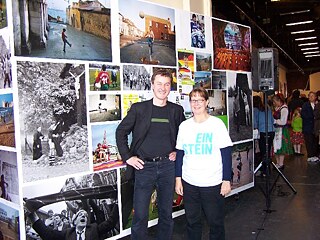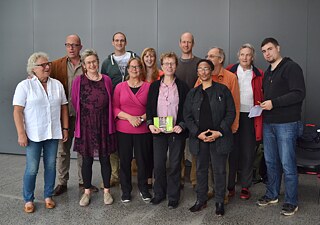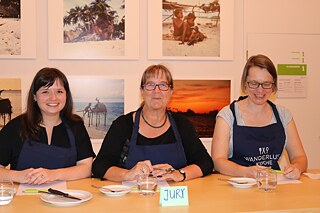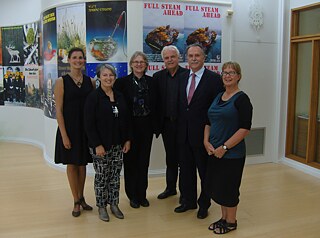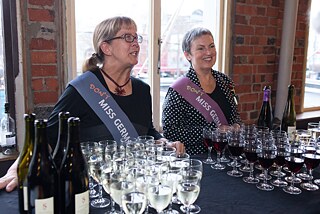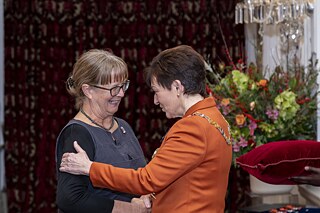Judith Geare – when a job becomes a vocation
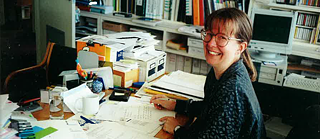
For 37 years she has been the “face” of the Goethe-Institut New Zealand, and her departure marks the end of an era. During a conversation with the journalist Alexandra Falk, looking back over her own career and the work of the Goethe-Institut, she said, “It’s only when I look up from my desk that I realise with a shock how many years I have been doing this. It seems like just the day before yesterday that I started work here …”
The full Podcast and sound bites have been recorded in German.
By Alexandra Falk
“How many people get to say they have worked in a job for 37 years, and have enjoyed every single day? That is a real luxury, and I am just so grateful.” These are the words that round off our interview, and we sit and let them echo for a moment around her spacious office. As she sits fidgeting with her glasses, I see a woman with a short ponytail and a big heart for German language, literature and music, plus enormous appreciation for her colleagues and the countless people she has taught German to during her career. For almost 40 years Judith Geare has been the face of the Goethe-Institut in Wellington, but this year the head of the language department is finally saying “goodbye”.
We stroll along Wellington’s well-known Cuba Street, among a colourful and lively throng of visitors and locals. The sounds of a flute-playing busker can be heard, and in the distance the splashing noises from the trademark of the Cuba Street shopping arcade – the bucket fountain. “I love Cuba Street, and I am so grateful to Knut Heuer (a past director of Goethe-Institut) for bringing us here”, Judith says. She knows the arcade like the back of her hand, because we are just a stone’s throw from the Goethe-Institut. “It’s hard to imagine”, she continues, “but back in the early 1990s you could hardly get a decent cup of coffee, even in Cuba Street – but now there are any number of good cafés”.
We keep walking down towards the waterfront, to the Wellington Public Library, now closed because of earthquake damage. Judith wants to show me where it all started – because it was here that Goethe-Institut opened its first office in New Zealand. That was back in 1980, four years before Judith turned up. “I was 29 when I started here”, she tells me. As we stand at a corner of Civic Square, she points to the library building, now closed. “We were at the corner of Mercer and Victoria Streets, in a little green three-storey building, really nice premises. I had an amazing classroom there. We moved out, our green building was demolished and the public library was built here.”
There is a photo of Judith, not quite from the 1980s, but taken in the early 1990s – it shows a young woman sitting in her office, now located in the current premises of the institute in Cuba Street, surrounded by a mountain of files and papers. She is looking straight unto the camera, laughing happily, with a look that seems to say, “There’s no such thing as too much work – I’ll get it all done somehow”. That’s Judith all over, says her long-time colleague, administration manager Elke Diedrichs: “Judith has never been scared of big projects. Some of the things we managed to do have been beyond the capabilities of bigger Goethe-Institut offices, with a staff of 20 or more”. Elke also tells me that Judith has always been able to think “outside the box”. In the 1990s, for example, when everyone started taking an interest in this strange new thing called the internet, Wellington became one of the first Goethe-Institut offices to offer German teachers training on how to use the new medium. “We just enjoyed doing what we did. We really liked being part of the institute. Judith never wrote anything off as a crazy idea – we always found a way to get the job done,” says Elke, who still today remains the institute’s “go to” person for IT matters.
Back in Civic Square I ask Judith if she can still remember her first day at work? “Absolutely, I was so nervous, because I was supposed to be teaching German, yet I wasn’t a native speaker. I thought that whatever happens I mustn’t make a mistake, I had practised for hours. And then the phone rang and it was someone from the German Embassy. I just about died – from the German Embassy, that was a very big deal!”. The call was actually from the embassy receptionist, who has since become a good friend, she tells me. She never expected to stay so long with Goethe-Institut, she continues. After completing her training at Christchurch Teachers’ College, she had teaching positions at various schools for just one year at a time, and even when she was taken on by the institute it was only supposed to be for a maximum of two years as a contract teacher. But fate had other plans ….
We continue our walk towards Anvil House in Wakefield Street. This building, formerly a registry office, provided an interim location for the Goethe-Institut staff for a year in 1989, pending the completion of renovations at the current premises in Cuba Street. While the institute director – the second in the position – had his hands full with planning the move to the new location, Judith was able to put all her efforts and energy into her language teaching role. “Over that year in Anvil House, things hadn’t felt right somehow. It was a big open-plan office space, with awful mustard yellowy-brown wallpaper from the 1970s,” she recalls, with a laugh.
Judith discovered her love for the German language back in her school days, she tells me, and later came to know and love Germany as a university student, spending time in Trier and Weimar on scholarships. She still laughs at the memory of prattling away to her host mother about “little unicorns” (Einhörnchen) instead of “squirrels” (Eichhörnchen): “German is just such a fantastic language. I can never understand people saying that German is an ugly language. When I first arrived in Germany and heard a female television announcer reading the weather forecast, my immediate reaction was ‘what a lovely sound!’.” Her favourite word in German has probably always been wunderbar, which no-one utters so often and with such enthusiasm as Judith does. This word seems to embody her fascination with a language in which she is constantly discovering something new, and which she never tires of passing on to others as a teacher.
We see a large “For Lease” sign up outside Anvil House. Judith raises her eyebrows, and with German directness tells me that she would never lease any rooms there again. I nod in agreement. “The only amusing thing I remember during that time was big Samoan families ringing at the door with their lovely little babies, wanting to register the birth. We had to tell them that the registry office was no longer located there”, she laughs.
We slowly set out on the return walk to Cuba Street – more precisely 148-150 Cuba Street, which has been the location of Goethe-Institut from 1990 to the present day. We talk about the highs and lows that an organisation like this inevitably goes through over a period of more than 40 years. Given her 37-year career with the institute, Judith has been there for virtually the entire history of the Wellington office.
There have been so many highlights, but one of them was definitely the performance of Wagner’s The Meistersingers at the International Festival of the Arts. That was just incredible,” she recalls. Then a whole stream of other high points come to her mind: exhibitions, concerts, poster campaigns, film screenings. “Once we moved into the Cuba Street premises, we got into cultural events in a big way,” Judith tells me. Another highlight has clearly been all the language students that Judith has taught over the years.
Later I learn from Elke Diedrichs that Judith has had a number of very famous German pupils – such as the filmmaker and actor Taika Waititi, at that time Taika Cohen, who gave a speech in German in 1999/2000 in the New Zealand Parliament during International Language Week. When I ask her about any low points over the years, Judith thinks before replying: “Whenever I heard that a secondary school had decided to stop offering German as a foreign language, that was always a very sad moment. And at one stage she was irritated at the lack of motivation of a previous institute director, but that was definitely the exception to the rule, she says. Judith has always believed that everyone working at Goethe-Institut should roll their sleeves up and get involved in all the office’s activities. “It’s about creating synergies, so that people say ‘Aha, you can learn German there, and we also saw this amazing exhibition from Germany’, for example. Synergies between language and culture are just so important, in my view.”
At the lower end of Cuba Street we turn back into the shopping arcade. The sound of the splashes of water from the bucket fountain are again to be heard in the distance, and the flautist is still there as well. A young teenager is sitting on the ground hammering away at his guitar, totally absorbed in his rendition of an Adele song. Then Judith stops suddenly, to greet an older man walking towards us: “Michael”, she calls out, smiling. He immediately strikes up a conversation in German, showing her some art prints of birds he is carrying under his arm. Seeing my astonishment, Judith explains that he is one of the “seniors” group at Goethe-Institut. The seniors group also comes up in my conversation with Elke, who remarks that Judith’s credo has always been to put all her energy and empathy into helping anyone who wants to learn German: “It doesn’t matter who they are, how old they are or where they come from, she welcomes them all as course participants. If only you could make a list of all the careers she can take credit for. Former course members sometimes come back to see us 20 years later, and we learn they have become tennis coaches, actors, musicians, football players, gallery owners, or opera singers – so many different people, and Judith took a real interest in all of them,” she says.
Elke and Judith have been close colleagues for most of Judith’s years at the Goethe-Institut in Wellington. Elke believes that Judith can take real pride in all the institute’s achievements. She was duly awarded the Goethe Medal from within the organisation, and then in 2019, as head of the language department she was appointed as a member of the New Zealand Order of Merit. “That was a very special moment for her, but I bet it means more to her to have made a real impact on the lives of so many German language pupils,” Elke says. I am curious to find out more, so on our way back to the institute I ask Judith again about her award. She says she sees being appointed a member of the Order as symbolic recognition of the work of the whole Goethe-Institut team, and of all German teachers in New Zealand: “I was really delighted, because it is very rare for foreign languages, and German in particular, to be recognised with this kind of honour. I saw myself as just the front person for the whole team, of teachers, learners and culture creators.”
We step into the lift in the office building that has become something of a second home for Judith. This is where she has invested all her energy and creativity over the past 37 years, taught countless hours of language lessons, and organised and implemented so many projects. “She’s a real powerhouse, it’s amazing. She is the first one here every morning, and often the last one to leave and turn out the lights in the evening. The thing I most admire about her is how she always wants to help people, and has so much empathy with them,” Elke says, as she looks back over their time as colleagues, and clearly also as friends.
The lift starts its upward journey, and Judith tells me she has enjoyed this tour through her career and memories. The lift doors open, and we are greeted in the institute entrance with the animated panting of Goethe by the painter Johann Heinrich Wilhelm Tischbein. “Herzlich Willkommen im Goethe-Institut Neuseeland” (Welcome to Goethe-Insitut New Zealand) says Goethe, through his animated lips, and Judith smiles in response.
As my last question, I ask: “If you had to draw a line under almost 40 years at Goethe-Institut …”, but she immediately interrupts me: “But I don’t want to draw a line, just like that! What would I do then?!” Maybe ask yourself what will remain with you, I suggest. Whereupon Judith’s face lights up: “Well yes, there is so much that will always be with me, if I start talking about it I will never stop. It’s especially the people I have known – all the people I have worked with for so long. All the people who have learned German, the fantastic German teachers in the secondary schools I had the privilege to work with, all the people who have got to know a little bit of Germany through a cultural event, the people who were able to go to a performance of The Meistersingers at the International Festival of the Arts, the people who have been to an exhibition or a performance by New Zealand Ballet, with a contribution from a German choreographer. I find networks and connection fascinating, and truly beautiful. They open doors to so many things!”
